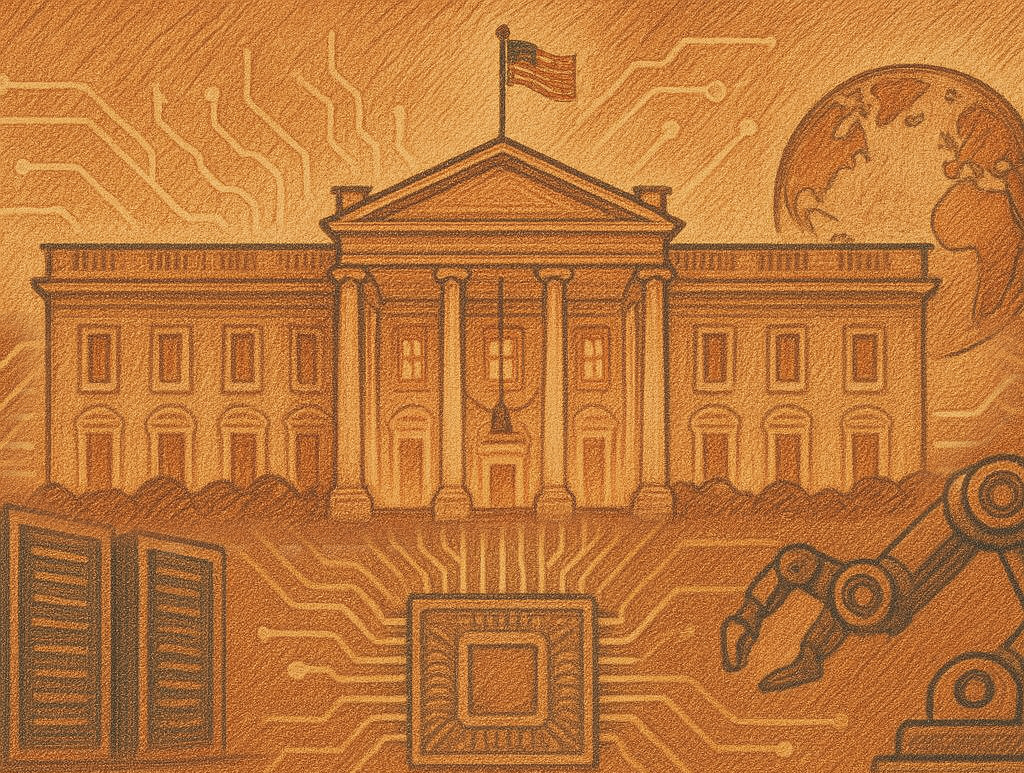The White House has officially released America’s AI Action Plan, a sweeping national strategy designed to cement the United States as the world’s AI superpower. Built around three pillars – accelerating innovation, building robust AI infrastructure, and leading international AI diplomacy and security – this plan is more than technology policy; it’s a roadmap for reshaping economic, defense, and technological leadership.
To win the AI race, the U.S. must lead in innovation, infrastructure, and global partnerships. At the same time, we must center American workers and avoid Orwellian uses of AI.
said David Sacks, White House AI and Crypto Czar.
Pillar I: Accelerating AI Innovation
The first pillar focuses on clearing regulatory bottlenecks and empowering the private sector to innovate at speed.
Key highlights include:
- Regulatory reform: Federal agencies are directed to identify and eliminate outdated rules slowing AI deployment.
- Open-source AI: Support for open-weight models to boost startups, research institutions, and small businesses.
- AI in science: Major investments in AI-enabled labs, high-quality scientific datasets and cutting-edge research to drive breakthroughs in materials, energy, and medicine.
- AI adoption in government and defense: From streamlining public services to deploying AI in the Department of Defense, the plan calls for government-wide AI integration.
- Workforce skilling: Federal funding for AI literacy, technical education, apprenticeships, and rapid retraining programs to prepare American workers for the AI-driven economy.
Pillar II: Building American AI Infrastructure
The plan underscores the critical role of semiconductors, data centers, and energy grids in powering next-generation AI systems.
Key moves include:
- Streamlined permitting for data centers and chip manufacturing to meet AI demand.
- Strengthening the power grid to ensure sufficient energy capacity for high-performance compute needs.
- Reviving U.S. semiconductor manufacturing via expanded CHIPS Act programs and partnerships with private industry.
- AI cybersecurity and critical infrastructure protections to ensure AI systems are secure by design.
- AI-ready workforce initiatives to train skilled trades like electricians and advanced technicians for AI infrastructure projects.
Pillar III: International AI Diplomacy and Security
The final pillar is about extending U.S. AI leadership globally while countering adversarial influence.
Highlights include:
- Exporting U.S. AI technology and standards to allies, ensuring American-built systems become the gold standard.
- Tighter semiconductor and AI compute export controls to prevent foreign adversaries from gaining access to cutting-edge U.S. technology.
- AI-driven biosecurity and national defense measures, with rigorous evaluation of frontier AI models for national security risks.
- Diplomatic efforts to shape international AI governance in line with U.S. values and innovation priorities.
Implications for Florida
Florida’s unique position as a technology and logistics hub could make it one of the biggest beneficiaries of this plan.
- Data Centers and Infrastructure: With streamlined federal permitting on the horizon, Florida’s rapidly growing data center footprint, particularly across Miami-Dade, Broward, and Central Florida, is poised to attract billions in AI-related infrastructure investment.
- Semiconductors and Advanced Manufacturing: Florida’s semiconductor and aerospace sectors could see renewed funding opportunities as part of the federal push to restore U.S. chip manufacturing.
- Defense and Homeland Security: Florida’s military bases, ports, and defense contractors are natural candidates for AI-powered logistics, security, and autonomous systems testing.
- Universities and Workforce: Institutions like the University of Florida (UF), Florida International University (FIU), and University of Central Florida (UCF) could tap into new federal programs for AI research, workforce training, and skilling, positioning graduates for the highest-demand jobs in tech.
Florida’s Call to Action
For South Florida startups, research centers, and innovation leaders, this is a rare window of opportunity. Federal dollars are about to flow into AI infrastructure, workforce development, and testbed programs for industries like healthcare, law enforcement, education, and logistics, all key sectors in our region.
The question isn’t whether AI will shape Florida’s next decade, it’s how fast we can mobilize as an ecosystem to seize these opportunities.
